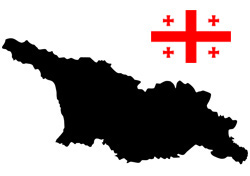Georgia is a transcontinental country located in the Caucasus, at the junction of Eastern Europe and Western Asia. From 1990 to 1995, it was known as the Republic of Georgia. The Black Sea borders it on the west, Russia on the north and east, Turkey and Armenia on the south, and Azerbaijan on the southeast.

It has a population of 3.7 million people, with an area of 69,700 square kilometres (26,911 square miles) and a population of 69,700 square kilometres (26,911 square miles) excluding the occupied areas. Georgia is a unitary parliamentary country administered by a representative democracy. Tbilisi is Georgia's capital and largest city, with a quarter of the country's population
Georgia is protected from cold air intrusions from the north by the Caucasian barrier, but it is constantly influenced by warm, moist air from the Black Sea. The climate in western Georgia is humid subtropical and marine, whilst the climate in eastern Georgia ranges from moderately humid to dry subtropical. There are also distinct height zones. The Kolkhida Lowland, for example, is subtropical up to about 1,600 to 2,000 feet, with a damp, fairly warm climate immediately above, and a belt of chilly, rainy winters and cool summers much above. There is an alpine climatic zone above 6,600 to 7,200 feet, with no true summer; above 11,200 to 11,500 feet, snow and ice are prevalent all year. At the same height, temperatures in eastern Georgia are lower than those in western Georgia.
A well-developed industrial base coexists with varied and automated agriculture in Georgia's economy. Agriculture employs roughly one-fourth of the workforce and accounts for about half of the gross domestic product; the industry and service sectors each employ around one-fifth of the workforce.
Political instability (which discouraged foreign investment), the loss of favourable trading relationships with former Soviet Union states, and civil unrest in Abkhazia and South Ossetia, where key pipelines and transport links were sabotaged or blockaded, all contributed to the Georgian economy contracting sharply after independence. Georgia attempted to restructure its command economy into one based on market principles by liberalising prices, reforming the banking system, and privatising some state-owned companies and retail businesses
The Georgian lari is issued by the National Bank of Georgia, which is also the country's central bank. Tbilisi is home to the majority of Georgia's financial institutions, including the stock market and most of the country's banks.
Georgia Capital – Tbilisi
Tbilisi, Batumi, Mtskheta, Borjomi, Kutaisi
Currency - Georgian lari
Local Language - Georgian
Area - 69,700 km²
National Plants- Cherokee rose
Čemi xaṭia samšoblo, Saxaṭe mteli kveqana, Ganatebuli mta-bari Ċilnaqaria Ɣmerttana
(India time is 1 hour and 30 minutes ahead of Georgia)
Driving Side - Left Hand
Dial Code - +995
ISO code- GEO
Climate - Humid subtropical climate
Government- Parliamentary democratic republic with a multi-party system.
Georgia – New Delhi Distance
3240 Kms
Russia, Armenia, Turkey, Azerbijan